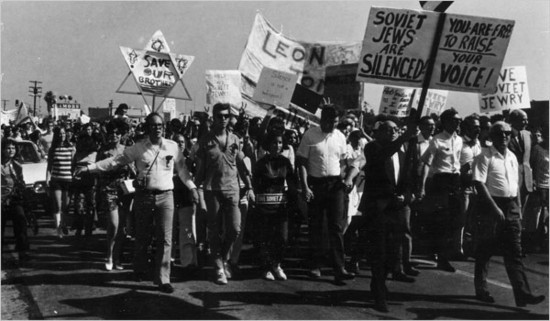FILM-FORWARD.COMReviews of Recent Independent, Foreign, & Documentary Films in Theaters and DVD/Home Video
Written & Directed by Laura Bialis Produced by Bialis & Stephanie Seldin Howard Director of Photography, John Ealer & Sarah Levy Edited by Allan Holzman & Tchavdar Georgiev Music by Charles Bernstein Released by Abramorama and the Foundation for Documentary Projects English, Russian, Hebrew with English subtitles USA. 117 min. Not Rated Our memories of the Evil Empire will always remain colored by steely James Bond villains and would-be commie conspiracies, but the real political issues are slowly beginning to fade. So it may be jarring to remember that not long ago, an issue like the plight of Soviet Jewry resonated so loudly around the world. Laura Bialis examines the 30-year-long global outcry on behalf of Jewish dissidents clamoring to leave the oppressive state. Their muffled pleas for freedom from behind the Iron Curtain were broadcast to the world by a grassroots movement fueled largely by students and housewives in the West, and this straightforward documentary is as much a tale of Soviet trials as of the movement’s triumphs. With no guiding narration, Bialis uses a patchwork of interviews to sketch the life of Soviet Jews from the tail end of Stalin’s regime to their mass exodus from a nation on the cusp of collapse. Their persecution came in many forms – straight-A students were rejected from University, mandatory identify cards stipulated nationality, and studying Hebrew was practically a crime. The fact that the Soviet government suppressed all religions probably should have been emphasized in the film, but the allegations of anti-Semitism are no less compelling. When Soviet citizens requested permission to emigrate (and were usually refused, hence the term “Refusenik”) their life fell apart almost immediately. Instantly marked as traitors, they were fired from their jobs and left in a state of social limbo, sometimes waiting decades for their exit visas to come through. As these often highly educated men and women flooded various menial positions, one dissident recalls being asked if she had a PhD to work as an elevator operator.
Refusenik simply, patiently, and chronologically merges its subjects’ narratives with minimal cinematic flare. Aside from a sparse soundtrack
of Jewish and Soviet melodies and a few clips from beloved Russian films, the documentary distinguishes itself from a History Channel special solely
by the caliber of its interviewees, most prominently Soviet dissident and Israeli political activist Natan Sharansky, who spent nine years in prison and
labor camps while his wife rallied the world to petition for his release. Airport scenes of their reunion, as well as the release of several famous
dissidents, constitute the emotional backbone of the film, which otherwise sacrifices sentimentality for fact.
Yana Litovsky
|
